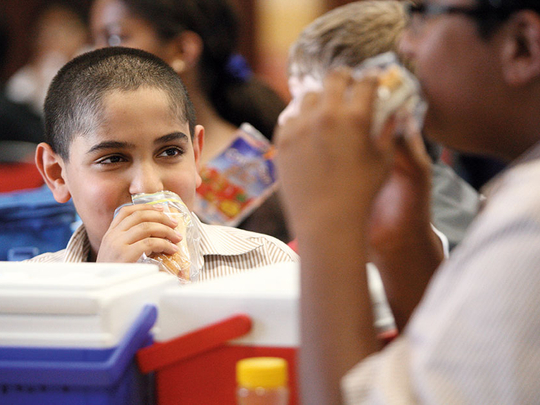
Dubai: Nearly 16-18 per cent of schoolchildren who suffer from food allergy experience a reaction during school hours but most schools are not equipped to deal with the situation, according to a survey.
The facility of Epi Pens (life-saving epinephrine injections) is not available in all schools who instead rely on over-the-counter anti-histamine tablets or make a 911 call, the survey revealed.
Conducted in 33 schools across Sharjah by a team of doctors from the University Hospital of Sharjah (UHS), the survey found that 14 children had an anaphylactic episode. Anaphylactic episodes are sudden, widespread potentially severe and life-threatening allergic reactions. Twelve of those children were provided with anti-histamine medication while two cases required Epi Pen jabs which are required for severe allergic reactions.
Based on the findings, the team is planning to make a recommendation to the Ministry of Education and Ministry of Health and Prevention to instruct schools to follow a set protocol to deal with food intolerances and allergies and include the Epi Pens in the health kit of every school.
Dr Mansour Ahmad, senior paediatrician with UHS, who was part of the survey team explained the terminology to Gulf News: “Worldwide, at least eight per cent of schoolchildren suffer from food allergies and can have reactions. A 2010 survey pointed out that in the UAE too, the number of schoolchildren with food allergies stood at eight per cent.”
Food allergy versus intolerance
Dr Ahmad made the distinction clear. “Food allergy such as that usually caused by the consumption of nuts, milk, eggs, a particular fruit or fish causes an immune system reaction that affects numerous organs in the body. It can cause a range of symptoms. There is an immune system response wherein a child can experience extreme itching to the throat and face, has rapid inflammation inside his throat that constricts breathing and results in a feeling of choking,” said Dr Ahmad. In some cases, an allergic reaction to a food can be severe or life-threatening.
“Usually, allergies are common in families which have a history of sensitivity to a particular food item or group [of foods] and therefore parents need to take cognisance of the fact and be sensitive if such a history exists in the family,” said Dr Ahmad.
“In contrast, food intolerance symptoms such as to lactose or gluten are generally less serious, indicative of some food groups not agreeing with your constitution and are often limited to digestive problems.”
Dr Ahmad explained that owing to the high incidence of food allergies, the hospital team first vetted a detailed questionnaire by the Ministry of Health and Prevention, took the necessary permissions from the Ministry of Education to cover at least 80 schools. “Of these, only 33 responded. Typically, in each of these schools, around 3,000 to 5,000 students are admitted. We looked at mild to severe anaphylactic response that the children may have displayed during a particular episode.”
Action plan
To counter the issue, the UHS team has advised a specific action plan for each school to adopt. Dr Ahmad said: “The purpose behind this survey was to educate the school authorities, doctors and nurses on duty and parents about such allergy episodes and prepare them to handle such emergencies swiftly. We would like to suggest to schools to keep at least two to three Epi Pens at schools in addition to anti-histamines and other medication and would like to train the school medical team in administering it,” he said.
What is an Epi Pen?
An Epi Pen consists of a single shot of the hormone epinephrine. Pens available in the pharmacies have prescribed specific paediatric doses. When a child has an extreme anaphylactic response to a food he ingested, there is a need to provide immediate relief. The doctor or the nurse is trained to evaluate and decide if the child’s condition can be managed by an anti-histamine pill or he requires an Epi Pen jab. It’s an intramuscular jab that constricts blood vessels, increases blood pressure and opens airways. It relaxes smooth muscles in the lungs resulting in a reduction in wheezing and improves breathing, stimulates the heart (increases heart rate) and works to reduce hives and swelling that may occur around the face and lips.
It is likely, pointed out Dr Mansour Ahmad, senior paediatrician with UHS, that the jab might temporarily relieve the symptoms and the child might require further investigation. “It is a life-saving jab and works quickly to relieve symptoms that can in many cases be fatal. Later, the child can be shifted to a hospital for further investigation and treatment.”
The hospital is also looking to create greater awareness about food allergies and educate parents. “We plan to have food allergy workshops and prepare [parents] for a quick response. The school authorities also need to have training as most food allergy episodes take place during the child’s time at school,” cautioned Dr Ahmad.
Case study
A.K., 18, a Dubai resident, first had a nut allergy attack at the age of seven. “I am allergic to walnuts and pecans and even a morsel of these can cause severe choking and swelling,” she told Gulf News. Recalling the first incident, she said: “No one in my family suffers from it. I was seven when I discovered this allergy quite by accident. My mother had baked a chocolate-walnut cake and the moment I had a small piece, my face and inner cheeks swelled up and it felt like my throat was closing up. I began wheezing. My mother gave me an antihistamine and it took me a whole day to recover. Any food allergic reaction is very painful and since then I have always kept an Epi Pen at home although I prefer to take an antihistamine because I am scared of needles. But the schools I went to in the UK and Austria had these Epi Pens which are a lifesaver and relieve the symptoms instantly. To this date, I never travel without antihistamines and I think it is important that schools keep Epi Pens,” she said.













